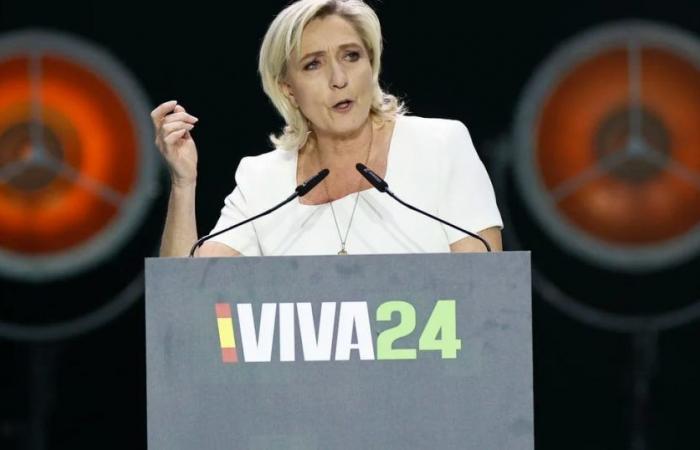
The leader of the far-right National Rally, Marine Le Penstated this Sunday that he will follow a model of cooperation with the president of France, Emmanuel Macronwho does not pursue his resignation out of “institutional respect.”
“I am very respectful of institutions and I do not pursue institutional chaos“Le Pen declared in an interview with the newspaper The Figaro. “I’m simply looking for cohabitation,” she added. In France, the forced coexistence between the president and the government of different political groups is known as cohabitation. It has occurred three times during the Fifth Republic, the last of them between 1997 and 2002.
National Group has been the great winning party in the European elections and could win again in the early legislative elections on June 30 and July 7. In this case, Le Pen argued that, If at the end of the legislative elections he is able to form a majority, he will propose the president of the party, Jordan Bardella, as the country’s new prime minister..
The precedents of this cohabitation suggest a distribution of powers between the head of State and the head of the Government. The president would be in charge of foreign policy and national defense while the prime minister would act as a kind of head of the Interior, with power also over health or education.
To do this, according to a recent Elabe survey, Le Pen needs 19 more seats, given that the National Rally could now get 270 seats in the Assembly. Macron and his allies would obtain between 90 and 130 of the total of 577 that make up the chamber.
The French president, Emmanuel Macronis in a race against time to obtain support for the early legislative elections, which he called after the unfavorable results of the European elections. The polls have already anticipated that the president could suffer a historic defeat and end up replaced by the extreme right.
That is why, in the last few hours, the Government announced a series of social measures that point to put “purchasing power as a central issue”since it is about the main concern of the French peopleaccording to recent surveys. “Earn more and spend less”, The Prime Minister, Gabriel Attal, announced that it will be the motto.
One of the main modifications that the Executive announced in the last few hours was that Electricity bills will reach homes 15% cheaper “from next winter” thanks to the “reform of the European market that we have obtained.” Although he did not provide further details in this regard, he commented that the decrease will respond to the possibility that French consumers use the electricity generated in nuclear power plants and no longer the last station of the process, from where the demands of the system are covered. marginalist and which is in charge of setting prices.
Also, he commented that it will be created A background so that both the middle class and the popular sectors can access thermal renovations in your homes, financed by a tax on share purchases. It is expected that in the next four years some 300,000 residences are reached by this benefit.
In the face of those legislative elections The polls that have been carried out since then predict a new victory for the National Group, which would obtain more than 30% of the votes in the second round, while in second position would be the new Popular Front made up of left-wing parties.
The main leaders of these formations were present at the Paris march, such as the first secretary of the Socialist Party (PS), Olivier Faure, which highlighted the importance of the unity achieved in less than a week around “a positive project to change lives, like in 1936 with the Popular Front.”
These types of messages to unity were confronted with the first frictions in the new coalition when it became known that La Francia Insumisa (LFI) has excluded from the investiture five of its outgoing deputies who had been implicated for their clashes with the leader of this party of the radical left, Jean-Luc Melenchon.
(With information from EP, AP and EFE)





